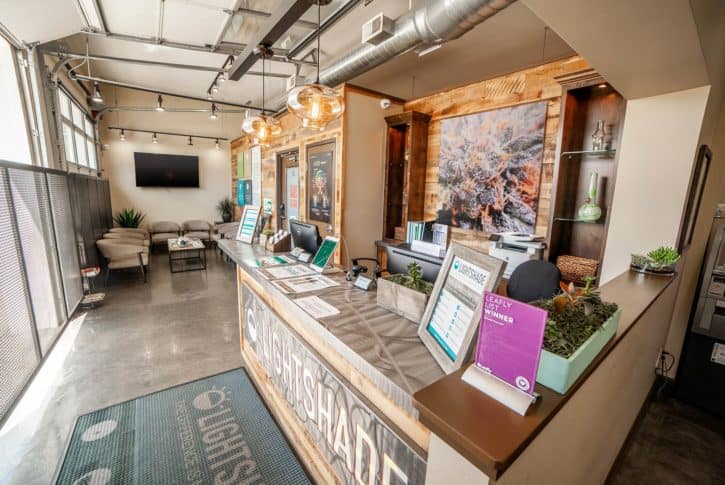As the cannabis industry matures, consumers are growing up along with it and gravitating toward more sophisticated products. Most cannabis data-tracking companies don’t distinguish premium brands from the rest of the products available on the market, but anecdotally, industry professionals say they’ve noticed more of their customers gravitating toward higher-end products.
“Edibles have maintained their share of the market — it’s similar to where they were pre-COVID,” said Lisa Gee, director of marketing and corporate social responsibility at Lightshade, a vertically integrated Denver-based cannabis business. “What is markedly different for us, and I think it’s a trend in Colorado that we’re learning about from our friends, is that people are spending more money on higher-priced boutique flower.”

Among the brands flying off store shelves is Cookies, the San Francisco-based cannabis brand founded by grow expert Jai and rapper and entrepreneur Berner. Lightshade didn’t carry anything that sold for more than $42 an eighth until Cookies entered the Colorado market; it sells for about $72 an eighth, Gee said.
So what is a premium brand? It depends on who you ask.
Alana Malone, co-founder and CEO of the Denver cultivation and extraction business Green Dot Labs, said that in the consumer packaged goods arena, premium prices are on the upper end of the prices that already exist in the marketplace.
“Premium is the top 20 to 30 percent of any category, but luxury is out of reach for most people,” Malone said.
Andrew Freeman, chief brand officer of the Los Angeles-based pre-roll cannabis company Drew Martin, said growing techniques are what set premium brands apart from the rest.
“Specifically with flower products or vape, it’s about the growing techniques that have allowed the cultivator to create an incredibly controlled environment with an outcome that is potent,” Freeman said. “Within legacy markets and legacy retail, premium often means growing indoors, it often means high potency, and very often there is a design element — beautiful packaging with gold or metallic foil used to connote a premium product.”
“At the end of the day it’s about the value of the product — it has nothing to do with price. The question is would I spend money on that again?”
Jon Spadafora, head of marketing and sales at Denver-based premium cultivator Veritas Fine Cannabis, defines premium products from the perspective of user experience.
“Premium products are effective, consistent, have an amazing taste and cool aroma,” Spadafora said. “At the end of the day it’s about the value of the product — it has nothing to do with price. The question is would I spend money on that again?”
Partnering with a premium brand
When Cookies wanted to get into the Colorado market, it executed a licensing agreement with Veritas, which grows and packages the lifestyle brand’s strains and distributes it to Colorado retailers.
“They knew they couldn’t go and start a new facility in every state,” Spadafora said. “They looked to people like us. For us, it was important that we weren’t just signing up with any brand. Berner is a cannabis legend before he is a hop-hop legend.”
Veritas dropped 35 pounds of Cookies cannabis the first day it was available; it sold out in eight hours, Spadafora said. While the buzz around Cookies has subsided slightly, lines still form at shops that send notifications to their customers that they’ve received a drop. The company recently delivered 65 pounds of Cookies to Colorado shops that Spadafora estimated would sell out in a few days.
“Every Friday, we’ll have 100 people tag us on Instagram while they’re opening either Cookies or Veritas,” he said.
While partnerships are one way to bring a premium brand into a new market, positioning your retail store as a luxury destination is another strategy some companies are taking. In Aspen, Colo., a mountain town that oozes wealth, Dalwhinnie Farms’ retail boutique is selling high-end goods alongside its premium cannabis brands — think Rolex watches and Italian umbrellas and leather goods.

“We’re trying to bring the top-notch quality of everything to our store,” said Ashley Grace, the company’s chief revenue officer. “The idea is we’re trying to de-stigmatize cannabis, and we’re using an alternative retail model to do so. We’re really focusing on a finely curated selection of interesting goods.”
The company promotes itself as meticulously growing proprietary cannabis strains at a purpose-built, advanced cultivation facility that shares its grounds with a 210-acre working equestrian ranch in the San Juan Mountains near Telluride, Colo. Its cannabis strains are available exclusively at its Aspen boutique.
“The Dalwhinnie products are for more of a connoisseur customer,” Grace said. “When we talk to customers about our product, the feedback we get is it’s by far the most superior product that they’re getting.”
Brands can also convey premium status through carefully curated events. Drew Martin had planned to launch its line of high-end pre-rolls with a series of dinners and cocktail parties, but the coronavirus pandemic forced the company to pivot to a virtual Zoom event. The company partnered with the exclusive Hollywood, Calf., club San Vicente Bungalows, which caters to A-list celebrities and power brokers.



The Zoom event featured company founder Drew Martin, a former mixologist who has worked in several James Beard Award-winning bars, conducting a cocktail-making class. Drew Martin delivered packages to participants that included a list of alcohol and other ingredients they would need for the event, as well as a box of pre-rolls, a lime, a lemon, a measuring cup and a few mixers and elixirs.
“(Martin) brings that expertise in the way a chef would to a high-end restaurant,” Freeman said. “It keeps a premium consumer interested in the brand and gets in on the storytelling around the product. As we’re moving into new markets, it’s been an incredible way to introduce ourselves.”
Pretty packaging
Beyond the quality of the products, premium packaging needs to exude extravagance.
“If you’re going to put the extra quality into the growing and curing, you have to convey that to the consumer and set an expectation that goes with it,” Grace said. “Packaging is critical to delivering on that expectation.”
Jon Spadafora said Colorado has been resistant to pre-packaged cannabis, as opposed to having it weighed out when purchased, but he knew that the Cookies brand was strong enough for customers to accept it. That allowed Veritas to succeed with its own brand of pre-packaged products.
“Berner is a man of the people,” Spadafora said. “His music is great, and it’s a very inclusive environment. It’s so different from what everyone else is growing.”
“Millennials as a group have high purchasing power and want a story and an emotion behind a brand”
While not all products in fancy packaging are premium, the aesthetic appeal of the container is important to ensuring a brand is attractive to millennials, a group that is more likely to invest in high-quality products and are increasingly demanding brands they can trust, said Susannah Grossman, marketing and sales director for Green Dot Labs.
“Millennials as a group have high purchasing power and want a story and an emotion behind a brand,” Grossman said.
It’s not only high-end cannabis flower and edibles that consumers are purchasing. They’re also interested in premium devices like DaVinci’s dual-use vaporizer. While the number of vaporizers the Las Vegas-based company has sold during the pandemic are down, its profits are up, DaVinci CEO Cort Smith said. That’s because while in-store sales have declined, higher-profit internet sales have increased.
“I’m sometimes amazed that people will spend $300 on an apparatus to ingest cannabis,” said Cort Smith, DaVinci’s CEO. “People are looking for safety. The FDA (Food and Drug Administration) hasn’t figured out how to regulate it.”
Drew Martin’s Freeman, who has worked with mainstream luxury brands like Tiffany and West Elm, said cannabis retail is evolving toward a more boutique experience, and brands must elevate their images to match.
“The experience has to be curated, authentic, aspirational but still approachable for consumers,” Freeman said. “We really want to create an experience that’s something special.”






1 thought on “Trend Watch: The move toward “premium” products”
Pingback: - Core Print & Packaging